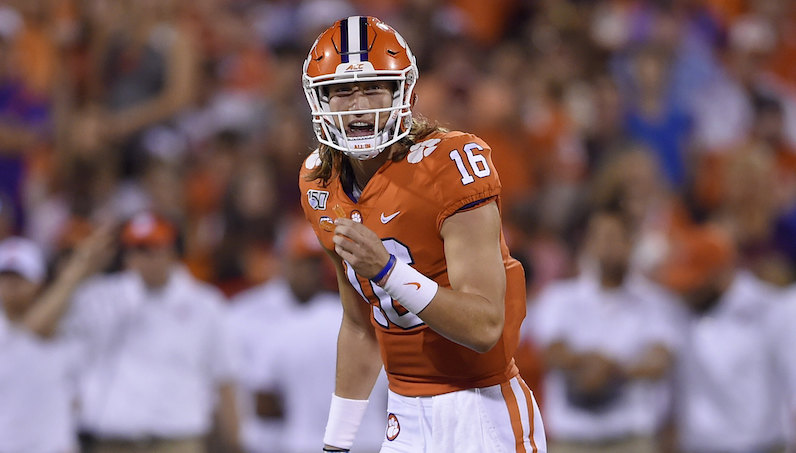The most bizarre week in college football history ended with a possibly historical moment — one that could change the landscape of college athletics for years to come. In the middle of a global pandemic, are major college football players on the precipice of forming a union? Perhaps it’s too early to say, but the #WeWantToPlay movement is here and, from the looks of things, this appears to be a fitting coda for an unprecedented week in these unprecedented times.
Mere days after the ACC announced its official schedule for the 2020 football season, the mood seemed to shift regarding the reality of playing a season this fall amidst COVID-19. On Sunday, Power Five conference commissioners held a meeting to further discuss the viability of a 2020 season. After months and months of indecision, the 2020 football season was quickly falling apart. Some P5 conferences, led by the Big Ten, may prefer to play football this spring. Either way, the outlook seemed rather grim.
However, come Sunday evening, prominent players across the ACC and other Power Five leagues took to social media to express their desires to play ball in the fall.
https://twitter.com/Trevorlawrencee/status/1292599402784325632
The “We Want To Play” hashtag started to fly around, too, as players from various programs chimed in with further encouragement.
— Sam Howell (@Sam7Howell) August 9, 2020
North Carolina quarterback Sam Howell was far from the only player along Tobacco Road to voice support of the movement. Veteran NC State linebacker Isaiah Moore was in agreement; so, too, were several of his Wolfpack teammates.
— Isaiah Moore (@_zaynlm) August 10, 2020
This, however, appears to be the start of something potentially much bigger than the inherent desire to perform football this fall.
Word broke late Sunday night — around midnight on the East Coast — that Lawrence and Clemson teammate Darien Rencher were in contact with representatives from every other Power Five conference regarding the creation of the #WeWantToPlay movement. It’s an organizing effort with some serious goals.
Power 5 Conferences all together pic.twitter.com/h1uX7198vo
— 𝐃𝐚𝐫𝐢𝐞𝐧 𝐑𝐞𝐧𝐜𝐡𝐞𝐫 (@D_Rench_) August 10, 2020
As Rencher stated on Twitter, they have teamed up with recent player-led organizing endeavors that emerged from the Pac-12 and Big Ten. (Last weekend, when I wrote about the emergence of the Pac-12’s #WeAreUnited movement, I highlighted the potential for these organizing groups to gather and display collective strength in numbers. It’s powerful and has the ability impact change. Well, here we are.)
Outside of the ACC, several other Power Five high-profile stars, like Ohio State’s Justin Fields and Oklahoma State running back Chuba Hubbard, made their opinions known, too: #WeWantToPlay.
This is Big!!! pic.twitter.com/5YwIZm6gSJ
— NCPA (@NCPANOW) August 10, 2020
For football players that want to play this fall, the initial list of demands appear simple, yet this type of cohesion escaped Power Five leaders for the entirety the last five months. As far as feasibility goes, well, that’s a mystery at the moment, but this is a good start. Here’s the upshot:
-
- Establish universal mandated health and safety procedures and protocols to protect college-athletes against COVID-19 among all conferences throughout the NCAA
- Give players the opportunity to opt out and respect their decision
- Guarantee eligibility whether a player chooses to play the season or not
- Use our voices to establish open communication and trust between players and officials; ultimately create a National College Players Association (NCPA)
From what Lawrence tweeted out on Sunday to the list of demands, it’s clear: lots of Power Five players want to play football, and believe that they’ll be safest regarding COVID-19 while around the healthcare services of their universities.
It’s no real surprise that players want to do what they love: play football. However, what schools choose to do with this, amid liability concerns, is another story. ACC leaders are set to meet on Monday.
To be clear, this effort is just a start; but it signifies a potential flashbulb moment — a necessary paradigm shift for the antiquated business model and decision-making process of major college athletics.
The 2020 season may still be lost or postponed, but college athletes that want to play are making sure their voices are heard, while also respecting their teammates and opponents that choose to opt out. That’s commendable, and it may prove to be historical, too.
There’s a long way to go and this can and will go in a thousand different directions but
this is a damn moment
— ¡BUM CHILLUPS AKA SPENCER HALL! (@edsbs) August 10, 2020
College football players have agency; their ability to demonstrate that power for collective gain is something that should worry the gatekeepers of inequity in the sport.
The #WeWantToPlay movement may just be the spark the lights the fire.

















